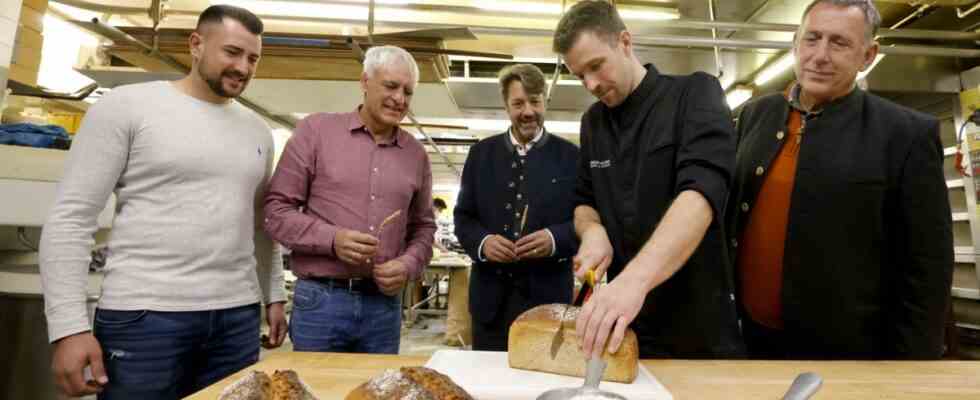Hardly any other country has such a large selection of breads to offer as Germany. “Our daily bread” was once even made from many more different types of grain. However, some of these have gradually been forgotten in the course of industrialization. In view of the current ecological crises, efforts have been made in Bavaria for some time to achieve greater diversity in grain cultivation. The first fruits of these efforts by the Ministry of Agriculture could be admired and tasted yesterday in the Freising bakery and confectionery Geisenhofer.
Master baker Stefan Geisenhofer was delighted with the new product. After all, he and his team had been working on the right recipe for very special new loaves of bread for a long time. These efforts seem to have paid off, because the bread made from the rustic “Freisinger Landweizen” was sold to the participants – who, in addition to the host bakery Geisenhofer, also included Stephan Sedlmayer, Klaus Fleißner and Ulla Konradl from the Bavarian State Institute for Agriculture (LfL) as well as the farmers Lorenz and Tobias scratch counted – without exception convincing. LfL President Stephan Sedlmayer was extremely satisfied with the presentation of the Urkornbrot, which is now ready for sale. A revival of older grain varieties would be beneficial “for all sides” and would benefit “society as a whole”, as it fills the “biodiversity strategy” of the Free State of Bavaria with life.
The initiative was started by the state government in 2008 to protect Bavaria’s biodiversity. Because it is not only heat and drought that are creating increasing pressure to change in agriculture in the course of global warming, the diversity of flora and fauna has also decreased rapidly in recent decades. A high diversity of life forms is a basic requirement for a functioning ecosystem. In addition to climate change, the current crisis in biodiversity represents another mammoth ecological task – also in Bavaria, where there is a great variety of cultivated plant varieties, but these are increasingly threatened with extinction.
Plant gene bank as a pioneer
Klaus Fleissner, who heads the project for the conservation of Bavarian agricultural plant genetic resources at the LfL, explained that the existing national genetic database for plant resources was explicitly searched for Freising grain varieties. The five grams per seed then made available for the project by the Leibniz Institute in Gatersleben had to be sufficient to find out which variety had the best chance of success. This could be found with the “Freisinger Landweizen”, which allowed the Freisinger Bäckerei Geisenhofer, which is participating in the project, to start the first baking attempts in 2020. Due to the “tasty results” achieved with bread and rolls at that time, this year the old variety was cultivated for the first time on the fields of farmers Lorenz and Tobias scratches, who have been farming organically since 1996.
In the end, consumers decide
The Geisenhofer bakery was hooked as soon as they heard about the existing project – according to master baker Stefan Geisenhofer, this fits in perfectly with their own “ideology of producing local food carefully and carefully”. Each dough rests for at least 48 hours before processing. This particularly long processing time is what is special about the company, which was founded seven years ago, and leads to very good tolerability. Some customers even reported that they could tolerate these breads, although they actually have intolerances. He attributes these effects to “own idealism” in production. It is “a great feeling to be able to taste the result of the project”.
A total of six tons of grain could be processed through the cultivation of the scratch farmers, which will “probably last until around Christmas” for bread production. If the demand for the special new loaf is correspondingly high, the production volume for “Freisinger Landweizen” can be increased “relatively flexibly” next year. The decisive factor is that the people of Freising like the rustic bread.
Even if the yield is “slightly lower” compared to some more common grains, the grain has great properties, as it is “greatly digestible” and “good taste” and also rich in nutrients. The miller who processed the grain was also “enthusiastic”. All sides thus drew a positive conclusion even before the introduction to the sale. However, the special bread was still missing one thing: a sales name. After baker Stefan Geisenhofer encouraged the group to search for ideas, the thought of the more than 100 farmers, bakers and millers participating in the LfL project, who officially act as “treasure keeper”, led to a breakthrough and a new “Freising treasure” was found.

